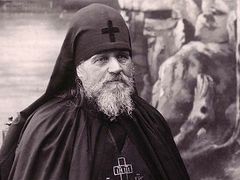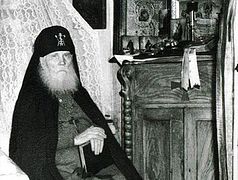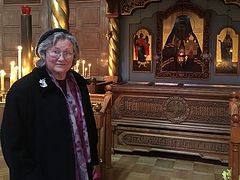“We should seek humility and not holiness because holiness without humility is vanity,” Archimandrite Sergei (Chévitch), who continued the traditions of the Valaam elders for Russian emigres in France, believed. July 25, 2019, marked the thirty-second anniversary of his repose.
A general’s son
 Archimandrite Sergei (Chévitch) Kirill Chévitch was born on August 3, 1903, in The Hague. His maternal grandfather was then in the Netherlands as a Russian Ambassador, whom Kirill’s parents, George Chévitch and Maria Struve, were visiting. The boy was named after his grandfather Kirill Struve.
Archimandrite Sergei (Chévitch) Kirill Chévitch was born on August 3, 1903, in The Hague. His maternal grandfather was then in the Netherlands as a Russian Ambassador, whom Kirill’s parents, George Chévitch and Maria Struve, were visiting. The boy was named after his grandfather Kirill Struve.
Kirill’s father was descended from a noble Venetian family, but his grandfather had moved to Russia where he commanded a regiment in the Royal Army. He fought bravely at the Battle of Borodino but was eventually killed in the Battle of Leipzig. As for George Chévitch, he was a high-ranking officer of the Russian Army.
When Kirill was about one month old, his parents returned to Russia with him. They hired the best tutors for the Chévitch children (Kirill had a brother and a sister), which enabled them to get a brilliant education at home. From early childhood they were taught three foreign languages at the same time. It is known that by the early age of eight the boy had mastered French.
In 1911, Kirill and his family moved to the city of Villmanstrand [the Swedish name for Lappeenranta.—Trans.] in Finland where at that time his father served as a colonel. The young man had fond memories of that period, especially of the chaplain of the dragoon regiment (commanded by George Chévitch), who instructed Kirill in the tenets of the Orthodox faith.
1914 was marked by another move, this time to Tsarskoye Selo [near St. Petersburg, where the Royal Palace was situated—Trans.] in connection with George Chévitch’s new appointment. This time he became a member of the imperial retinue and had to move to the Royal Residence. As was the case with the children of senior serving military officers of the time, Kirill obtained a military education and as a boy of eleven he was made a honorary officer.
In 1916, the family temporarily moved to Tiflis [the name of Tbilisi till 1936—Trans.], where Georgy Chévitch’s garrison was then stationed. After the Revolution of 1917, the family was deprived of all they had—their property was confiscated. They were forced to move from St. Petersburg to Kislovodsk, where they stayed till 1920.
The forced emigration
In October 1920, the Chévitchs were forced to emigrate from Russia. After a short stay in Switzerland, where Kirill nevertheless got a bachelor’s degree, they found refuge in Germany. The Chévitchs spent two years in Berlin. There Kirill was employed by a bank. Finally, in 1923, they settled in Paris. Kirill found an honorary position at J.P. Morgan where he kept the accounts of kings and queens.
Distinguished representatives of the Russian diaspora would often gather in the Chévitchs’ mansion. Kirill joined the Young Russians movement in 1923, which aimed to restore the monarchy in Russia. Kirill was a member of this movement (first as its treasurer, and then on the board of directors) until its closure in 1933, though in the final years he distanced himself from its founder, Alexander Kazem-Bek, who became favorably disposed towards the Nazi ideology.
Apart from the Young Russians movement, Kirill also attended meetings of the Fellowship of Sts. Alban and Sergius which initiated a dialogue between Orthodox and Anglicans in the UK. He also took active part in meetings of intellectuals at Nicholas Berdyaev’s house in Clamart, France, attended lectures on theology and Patristics in Oxford, and contributed to the Vestnik magazine.
Faithful to the Mother Church
When Metropolitan Eulogius (Georgievsky), who had been head of the Provisional Administration of the Russian Parishes in Western Europe, was received by the Patriarchate of Constantinople in 1930, Kirill was one of the few to remain faithful to the Moscow Patriarchate. His interest in the spiritual life was increasing steadily at that time. He took an active part in the establishment of a new parish of the Moscow Patriarchate—the Church of the Three Holy Hierarchs in Rue Petel, Paris.
Significantly, when there was another split in the Russian Diocese in Western Europe after a temporary rapprochement in 1947, Kirill once again remained faithful to the Mother Church, not fearing the prospects of being in the minority.
Choosing monastic life
At that time, Kirill’s spiritual father was Archimandrite Afanasy (Nechayev), who had been trained at the Russian Valaam Monastery. Fr. Afanasy was also known as the father-confessor of Andrei Bloom (the future Metropolitan Anthony of Sourozh), which Metropolitan Anthony mentioned more than once in his memoirs.
At that stage, Kirill felt a calling to take up monasticism ever more keenly. But since his entire family depended on him financially, he revealed his intentions to no one. It was only in 1938 that Kirill began to correspond with St. Silouan of Mt. Athos, revealing his desire to him. The elder blessed him to become a monk with the following words: “Go and call upon all people with all your strength: ‘Repent!’” But soon the Second World War prevented Kirill from visiting Mt. Athos.
In late May 1940, as a former member of the Young Russian organization, Kirill came under suspicion and was arrested by French authorities. He was sent to the Vernet concentration camp. Though he was soon released, on June 22 1941, he was arrested again by the German occupation authorities and was sent to the concentration camp at Compiegne.
While imprisoned, Kirill became certain of his desire to take monastic vows, which he did straight after his release. It took place on November 18, 1941. Kirill’s father-confessor was then Archimandrite Stephen (Svetozarov), rector of the Holy Trinity Church in Vanves. Fr. Stephen had been tonsured at Valaam Monastery, so it was no coincidence that Kirill received the new name Sergei, in honor of St. Sergius of Valaam.
Ordination
On September 11, 1945, Bishop Vladimir (Tikhonitsky) ordained Fr. Sergei a hierodeacon, and on the following day he was ordained a hieromonk. Fr. Sergei was immediately appointed rector of the Holy Trinity Church in Vanves in place of his spiritual father, Archimandrite Stephen, who was assigned to another parish. A little later Fr. Sergei was also appointed abbot of the Holy Spirit Skete in Le Mesnil-Saint-Denis [in the Yvelines department, France—Trans.].
In this context it is important to note that even in this period his link with the tradition of Valaam Monastery was not cut off—as we know, Fr. Sergei corresponded with the famous Valaam elder Fr. Chariton (Dunayev), whose advice he always heeded.
In the 1950s, Fr. Sergei was elevated to the rank of archimandrite. He was offered the episcopate on several occasions, but he humbly declined each time, considering himself unworthy of this rank.
A father-confessor
The following fact bears witness to his great authority as a pastor: Among Archimandrite Sergei’s spiritual children were such figures as Vladimir Lossky, Nicholas Berdyaev, the renowned icon-painter Monk Gregory (Krug), and other Russian and French intellectuals. Although, Fr. Sergei, realizing the huge responsibility of spiritual instructor, never tried to become a spiritual father—on the contrary, people had to ask him for a very long time to agree to this.
According to the memories of the French theologian Jean-Claude Larchet who compiled the elder’s biography, Archimandrite Sergei always tried to push himself into the background, making room for Divine grace. Larchet recalled:
“Whenever I confessed my sins to Fr. Sergei, I felt the power of his spiritual presence keenly; at the same time, all of his individual traits were driven into the background. It seemed that the elder was becoming absolutely transparent and permeable to God.”
Fr. Sergei’s self-depreciation was so strong that it seemed as if he never remembered himself. Whenever someone asked him how he was doing, the elder answered: “So and so is sick, so and so has suffered a tragedy, and so and so has gotten into trouble.”
Archimandrite Sergei had a special attitude towards faith: He tried to avoid abstract reflections on spiritual themes and broke off such conversations, trying to switch them to an everyday topic. He feared the situations when real life didn’t agree with words on spirituality—he warned everyone against this. It was obviously for this reason that Fr. Sergei never delivered sermons.
Two visits to Russia
Archimandrite Sergei first visited Russia in adulthood in 1947. The trip lasted only several months, and among his companions was the future Bishop Seraphim (Rodionov). The next visit to his motherland was timed to the enthronement of Patriarch Pimen in 1971. Archimandrite Sergei never returned to Russia again.
Illness and death
Archimandrite Sergei’s state of health began to deteriorate dramatically in 1985. His medical condition worsened, and in the autumn of 1986 he had to go to the hospital at Courbevoie [an industrial suburb of Paris.—Trans.] to undergo medical examinations. He was finally diagnosed with extensive pleurisy. After medical treatment, Fr. Sergei returned to Vanves for some while, but on June 3, 1987, he was rushed to the hospital due to hemiplegia. By that time his body had already been affected by cancer. Archimandrite Sergei (Chévitch) reposed peacefully on July 25, 1987.
Spiritual sayings of Archimandrite Sergei
On our relations with God
 Archimandrite Sergei The fear of God is the fear of being separated from God.
Archimandrite Sergei The fear of God is the fear of being separated from God.
We shouldn’t strive to penetrate Divine mysteries with our minds. We must accept the mystery. It won’t be revealed to us until we accept it as such.
In order to receive something from God we need to ask Him with humility and not judge anyone.
We should try and think less of ourselves and think more about God all the time.
We must love God and not just comprehend and know Him.
We should treasure a sense of mystery towards God. I am pleased when I don’t know.
Christ became Man, for the human nature was the only place where man and God could meet. Otherwise he would have been scorced by God, as was Moses on Mount Sinai.
Perfection is not the perfection of man but that of God in man.
On relations with our neighbors
The truth and all that is related to it should never be compromised, but we should be extremely tolerant of people who sin and err.
We must respect people more than they seemingly deserve it.
Self-obsession is the beginning of a mental illness. The foundation of mental illness is putting yourself at the center of the universe.
What really matters is love. The apostle Paul said: And though I have the gift of prophecy, and understand all mysteries, and all knowledge; and though I have all faith, so that I could remove mountains, and have not charity, I am nothing (1 Cor. 13:2). The demons are able to fathom and comprehend just as we are, but they cannot love.
If we want to deepen our relations with other people, we need to pray for them. We should also pray before telling them anything. It is thanks to our prayer that we will understand what we should say and what we shouldn’t say to them.
All that concerns love for our neighbors is based on prayer for our neighbors.
On humility
Humility is the shortest path to salvation, without which everything collapses.
True knowledge is not attained by mental exertion, nor even by an act of thinking. True knowledge is acquired through humility.
We should be humble for God’s sake. If people make use of and abuse our humility, then nevermind. People abused the humility of many saints. We shouldn’t worry about that: All that matters is our state before God.
We should seek humility and not holiness, because holiness without humility is nothing but vanity.
Humility is the basis of the spiritual life and, at the same time, like love, it is its summit.
On repentance
We should offer repentance permanently, not for something wrong that we have done, but because of the fact that our nature is weak. We must repent of being what we are.
When we repent we should take into account not only the bad deeds we have done but also all the good things we have not done.
God prefers him who commits sins and repents to him who believes that he has no sins and thus doesn’t repent.
Repentance is the key to the spiritual life. It allows us to put on the wedding robes without which we will be thrown out.
Repentance is not just an act associated with one or another sin that has been done once; rather, it is a permanent, ongoing state.
As soon as we have plunged into a bad mood, we need to ask for God’s forgiveness.
On prayer
Prayer is the language of the world to come.
We should pray unceasingly. Prayer is both the nourishment and life of the soul. Without prayer, the soul withers and dies.
The strength to resist sin comes from God, and we get this strength through prayer.
If we cannot pray during every kind of work, then at least we must do all our work in the spirit of prayer.
Prayer should necessarily be regular. Prayer eventually penetrates our souls just as drops of water wear away the stone onto which they drop over and over again.
We shouldn’t devote one or two moments of the day to prayer. Prayer must be the driving force of our entire lives. We should learn not to do anything without prayer.
The Jesus Prayer without humility is a catastrophe.
What is of prime importance in prayer is the spiritual impulse. Prayer should be accompanied by repentance. Christ came to this world to teach us repentance, not technique.
Prayer is like a light that illuminates everything around and that enables us to examine the depths of our souls closely.
Prayers for the departed are very important to them and us alike. At the same time, it is the expression of our belief that there is no death.
On spiritual life
Spiritual growth manifests itself in the abandonment of worldly cares with determination rather than in brilliant acquisitions.
External circumstances can never be used to justify the defects of the inner life.
Our life is in Heaven—our true life. And we must live by this already here on earth.
People are not expected to “take leaps.” They need to walk towards God gradually but with consistency. The “middle path” is the royal path.
Patience is absolutely necessary in the spiritual life. It is born from humility.
A rule for life: Pray more and deliberate less.
We should beware of extremes in the ascetic life. We need to keep fit not only spiritually, but also physically. The flesh should be strengthened and not mortified. Christ Himself took care of His body: He ate and slept.
We should take care to constantly concern ourselves with the things that have to do with God and not with ourselves.
The only thing we should seek is that the Lord would look down on us in His mercy and accept us.
We must live in God and not in ourselves. Being self-content is very dangerous.
We must love the Heavenly world and seek it whatever the cost—the world above and not this physical world, which is too fragile and unstable.
The great mystery of spiritual life is that we act by the power of God and not our own. To have Christ in us is a great mystery.
We should care about the destiny of our souls upon separation from the flesh and not the destiny of the entire world; about our own end and not the end of the world; about our own destiny and not the destiny of the whole of society.
We should always feel as someone who is waiting for a train feels, knowing that the train may arrive at any tick of the clock.
We are in this world to endure hardships.
We should live through every day as if it were the last. For all that, we shouldn’t say that one day doesn’t matter. If the words of the apostle that one day is with the Lord as a thousand years (2 Pet. 3:8) are true, then it is also true that every single day is as important as a thousand years.
The purpose of the struggle is not to cease the struggle one day. The warfare will go on forever. But the longer we struggle, the greater our chances of winning a victory in this battle.




